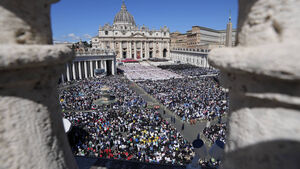Herald Opinion: A legacy of moral courage

A view of the funeral of Pope Francis in St. Peter's Square at the Vatican, Saturday, April 26, 2025. (AP Photo/Gregorio Borgia)
The image of President Donald Trump and Ukraine’s Volodymyr Zelensky talking with one another in St Peter’s Basilica, ahead of the funeral of Pope Francis, made the pages of newspapers around the world.
It was an image that would have delighted the heart of Pope Francis. Sceptics might say that it was just another photo opportunity while the eyes of the world were on Rome as the world mourned Pope Francis, but if it is the impetus to revitalise the peace negotiations then the Pope’s legacy will have left a truly lasting mark.
Pope Francis, born Jorge Mario Bergoglio in Argentina, has left a profound and transformative legacy on the Catholic Church and the wider world.
Elected in 2013 as the first Pope from the Americas, his pontificate was marked by a deep commitment to humility, social justice, environmental stewardship, and pastoral outreach.
One of his most defining traits was his emphasis on mercy and compassion. His papal motto, “Miserando atque eligendo” (“by having mercy and by choosing”), reflected his focus on God's forgiveness and the Church’s duty to reach those on the margins.
He was also a strong advocate for the poor and disenfranchised, repeatedly calling on global leaders to address economic inequality. He urged the Church to be a “field hospital” that tended to the wounds of the suffering, rather than an institution focused solely on rules and doctrine.
While admired for his progressive tone, Pope Francis also faced criticism, particularly from conservative factions within the Church. His more open stance toward LGBTQ+ individuals and his call for the Church to better welcome divorced and remarried Catholics sparked both praise and controversy. Nonetheless, he consistently emphasised dialogue, discernment, and a Church that listens before it teaches.
In global politics, he served as a moral voice advocating for peace, refugee rights, and interfaith cooperation. His outreach to Muslim, Jewish, and Orthodox leaders helped build bridges in a world often marked by division.
Ultimately, as the world grieves his death his legacy is one pastoral care, moral courage, and a profound belief in the Church’s mission around the Gospel values of love, service, and justice.
His papacy reawakened conversations about what it means to live a faith that is both deeply rooted in tradition and boldly responsive to the modern world.
His death marks the end of an era. The next Pope, who will be chosen in the days to come, will put his own stamp on the institution. Whoever that is, in a radically changed world he must appeal to world leaders to show compassion and mercy, just like his predecessor did.





